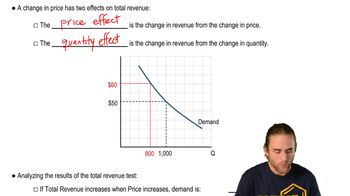Table of contents
- 1. Introduction to Macroeconomics1h 57m
- 2. Introductory Economic Models59m
- 3. Supply and Demand3h 43m
- Introduction to Supply and Demand10m
- The Basics of Demand7m
- Individual Demand and Market Demand6m
- Shifting Demand44m
- The Basics of Supply3m
- Individual Supply and Market Supply6m
- Shifting Supply28m
- Big Daddy Shift Summary8m
- Supply and Demand Together: Equilibrium, Shortage, and Surplus10m
- Supply and Demand Together: One-sided Shifts22m
- Supply and Demand Together: Both Shift34m
- Supply and Demand: Quantitative Analysis40m
- 4. Elasticity2h 26m
- Percentage Change and Price Elasticity of Demand19m
- Elasticity and the Midpoint Method20m
- Price Elasticity of Demand on a Graph11m
- Determinants of Price Elasticity of Demand6m
- Total Revenue Test13m
- Total Revenue Along a Linear Demand Curve14m
- Income Elasticity of Demand23m
- Cross-Price Elasticity of Demand11m
- Price Elasticity of Supply12m
- Price Elasticity of Supply on a Graph3m
- Elasticity Summary9m
- 5. Consumer and Producer Surplus; Price Ceilings and Price Floors3h 40m
- Consumer Surplus and WIllingness to Pay33m
- Producer Surplus and Willingness to Sell26m
- Economic Surplus and Efficiency18m
- Quantitative Analysis of Consumer and Producer Surplus at Equilibrium28m
- Price Ceilings, Price Floors, and Black Markets38m
- Quantitative Analysis of Price Ceilings and Floors: Finding Points20m
- Quantitative Analysis of Price Ceilings and Floors: Finding Areas54m
- 6. Introduction to Taxes1h 25m
- 7. Externalities1h 3m
- 8. The Types of Goods1h 13m
- 9. International Trade1h 16m
- 10. Introducing Economic Concepts49m
- Introducing Concepts - Business Cycle7m
- Introducing Concepts - Nominal GDP and Real GDP12m
- Introducing Concepts - Unemployment and Inflation3m
- Introducing Concepts - Economic Growth6m
- Introducing Concepts - Savings and Investment5m
- Introducing Concepts - Trade Deficit and Surplus6m
- Introducing Concepts - Monetary Policy and Fiscal Policy7m
- 11. Gross Domestic Product (GDP) and Consumer Price Index (CPI)1h 37m
- Calculating GDP11m
- Detailed Explanation of GDP Components9m
- Value Added Method for Measuring GDP1m
- Nominal GDP and Real GDP22m
- Shortcomings of GDP8m
- Calculating GDP Using the Income Approach10m
- Other Measures of Total Production and Total Income5m
- Consumer Price Index (CPI)13m
- Using CPI to Adjust for Inflation7m
- Problems with the Consumer Price Index (CPI)6m
- 12. Unemployment and Inflation1h 22m
- Labor Force and Unemployment9m
- Types of Unemployment12m
- Labor Unions and Collective Bargaining6m
- Unemployment: Minimum Wage Laws and Efficiency Wages7m
- Unemployment Trends7m
- Nominal Interest, Real Interest, and the Fisher Equation10m
- Nominal Income and Real Income12m
- Who is Affected by Inflation?5m
- Demand-Pull and Cost-Push Inflation6m
- Costs of Inflation: Shoe-leather Costs and Menu Costs4m
- 13. Productivity and Economic Growth1h 17m
- 14. The Financial System1h 37m
- 15. Income and Consumption52m
- 16. Deriving the Aggregate Expenditures Model1h 22m
- 17. Aggregate Demand and Aggregate Supply Analysis1h 18m
- 18. The Monetary System1h 1m
- The Functions of Money; The Kinds of Money8m
- Defining the Money Supply: M1 and M24m
- Required Reserves and the Deposit Multiplier8m
- Introduction to the Federal Reserve8m
- The Federal Reserve and the Money Supply11m
- History of the US Banking System9m
- The Financial Crisis of 2007-2009 (The Great Recession)10m
- 19. Monetary Policy1h 32m
- 20. Fiscal Policy1h 0m
- 21. Revisiting Inflation, Unemployment, and Policy46m
- 22. Balance of Payments30m
- 23. Exchange Rates1h 16m
- Exchange Rates: Introduction14m
- Exchange Rates: Nominal and Real13m
- Exchange Rates: Equilibrium6m
- Exchange Rates: Shifts in Supply and Demand11m
- Exchange Rates and Net Exports6m
- Exchange Rates: Fixed, Flexible, and Managed Float5m
- Exchange Rates: Purchasing Power Parity7m
- The Gold Standard4m
- The Bretton Woods System6m
- 24. Macroeconomic Schools of Thought40m
- 25. Dynamic AD/AS Model35m
- 26. Special Topics11m
4. Elasticity
Total Revenue Test
Multiple Choice
Multiple ChoiceA price change causes the quantity demanded of a good to decrease by 20 percent, while the total revenue increased by 10 percent. The demand curve is:
A
Elastic
B
Unit-Elastic
C
Inelastic
D
Perfectly Elastic

 9:31m
9:31mWatch next
Master Total Revenue Test with a bite sized video explanation from Brian Krogol
Start learningRelated Videos
Related Practice


